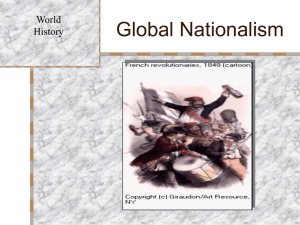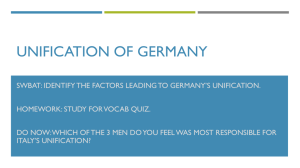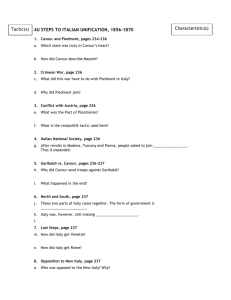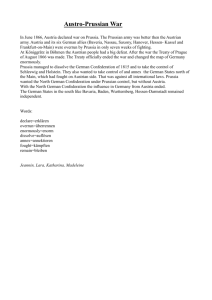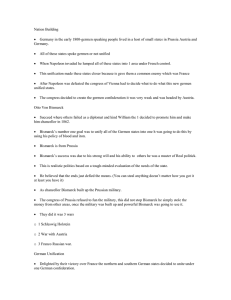Nationalism in Europe 2014
advertisement
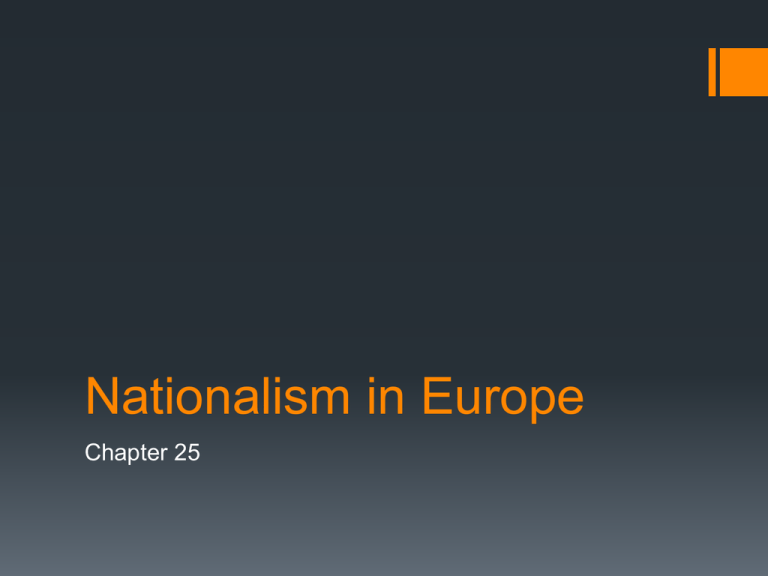
Nationalism in Europe Chapter 25 1500-1600 Renaissance -Reformation -Scientific Revolution -Exploration -Absolutism -Spain World Power 1600-1700 -Colonization of New World -Mercantilism -Industrial Revolution Begins -Absolutism -England World Power -English Civil War 1700-1800 -Age of Enlightenmen t -American Revolution -French Revolution 1800-1900 -Age of Napoleon -Congress of Vienna -Life Centered Around Factory System -Rise of Capitalism and Socialism -Rise of Nationalism -Rise of Imperialism 1900-2000 -WWI -WWII -Cold War -Nat. Movements Worldwide -1st Gulf War Unification of Italy Liberals & Nationalists Risorgimento – nationalist movement “resurgence” – liberation & unification Carbonari – secret society dedicated to the Risorgimento Guiseppe Mazzini – Young Italy movement – “neither pope nor king, but a republic” Affiliation: Form of Gov’t Candidate Liberals Republic Camillo Benso di Cavour / Sardinian Parliament Conservatives Federation of Italian States ruled by Pope King Victor Emmanuel II Cavour’s Sardinia Chief Minister Reorganized and Strengthened the Army Est banks, factories & railroads to improve trade Believed in separation of church & state Tried to reduce influence of church in politics even Jesuits Sided with France & GB during Crimean War = increased political influence 1858 created secret alliance with Napoleon III against Austria War with Austria At 1st all went as planned Lombardy liberated by French & Sardinian forces Tuscany, Modena & Parma liberated and annexed into Sardinia Napoleon III feared Prussia Signed armistice with Austria Gave Lombardy to Sardinia and Venetia to Austria Tuscany, Modena & Parma go back to Austria France gets Nice and Savoy Tuscany, Modena, Parma & Romagna back to Sardinia after revolts Garibaldi & the Thousand Giuseppe Garibaldi led the push to unify the Kingdom of Two Sicilies 1860 Garibaldi & his “Expedition of the Thousand” invade and capture Sicily then the capital of Naples Cavour sent an army to stop Garibaldi on his way to Rome Feared Garibaldi would supplant Victor Sardinia annexed the Papal states Garibaldi promised to support the King and unification in return for the Governorship in Naples - denied Finally Unification Series of Events: 1860 Plebiscites for national unity except Venetia & Rome 1861 Meetings in Turin make Victor Emmanuel II king of Italy 1866 Italy gains Venetia in war with Austria 1870 Rome votes to unify with Italy 1871 Rome becomes capital Problems Little experience with self gov’t Cultural divides Industrial North vs. Agricultural South Poor standard of living Labor problems The Zollverein Economy 1st Step in German Unification Junkers – aristocratic landowners (tradespeople, intellectuals, financers and manufacturers) convinced Prussian King to abolish tariffs within territories 1834 German states create the Zollverein (customs union) – No Austria Drove down prices – created uniformity (weights, measures, currency) Industrialization spread – free market, protection from competition Bismarck & Prussian Strength 1861 William I becomes King of Prussia Otto von Bismarck appointed to head of cabinet Built the Prussian army Opposed democracy & the idea of parliament State not the people should hold authority Prussia’s destiny was to unify Germany Opposed by Prussian parliament – collected taxes w/o approval Wars of Unification Danish War Two duchies, Schleswig & Holstein under Danish rule (separate from Denmark) King Christian IX tried to annex both for Denmark War b/w Denmark and Austria & Prussia broke out Treaty gave Schleswig to Prussia & Holstein to Austria Seven Weeks War Provoked Austria into war Used tech to advantage (train, telegraph & modern weapons) Treaty of Prague Dissolved German Confederation Holstein to Prussia – Venetia to Italy North German Confederation – Northern German states & Prussia Prussian King head – state had self gov’ts – dominated the legislature of Confed Franco-Prussian War Bismarck baits France to war with a fake telegram Southern German states united against the French Defeated France in a few months France lost Alsace & part of Lorraine – paid an indemnity German Empire is Formed Jan 18th 1871 – Hall of Mirrors @ Versailles German Empire declared All German states, Prussia except Austria – Berlin capital King William I – Emperor, Bismarck Chancellor Formation of the German Empire Federal Gov’t – 25 German States National Defense, Foreign Affairs, Commerce Local gov’t – police, taxes, education Kaiser = emperor – appointed Chancellor & commanded military Defensive war on own – offensive war w/legislature Legislature – 2 Houses Bundesrat – upper house. 58 appointed members Reichstag – lower house, legislative assembly, 400 members (elected) Limited in power – couldn’t effect any liberal or democratic change Prussian interests strongly represented in German constitution Bismarck’s Opposition Political Parties formed opposing Bismarck’s ideas Reps in Prussian legislature were conservative System was rigged for upper class Kulturkampf “culture struggle” – regulated Catholicism Expelled Jesuits – forbade political expression from pulpits Clergy must be German and educated in German schools Diplomatic relations were broken w/Vatican Bismarck eventually needs the Catholics – reestablished relationships Ended in failure in 1887 Industrial Development German Gov’t promoted industrial development Rich stores of natural resources (coal & iron) Gov’t managed railroads – created a system of canals Industry had best tech available to industrialize Money & banking laws are standardized Post office centralized Encouraged cartels High-tariff policy – keep out foreign competition Socialism in Germany Cartels = bad work environments Called for gov’t ownership of major industries 1869 Social Democratic Party (SDP) – urban workers Used the Reichstag as a pulpit Bismarck used all of his power to fight socialism Blamed assassination attempts on Social Democrats Emperor & Bundesrat dissolved the Reichstag Banned public meetings of Socialists Prohibited newspapers, books or pamphlets spreading socialism Bismarck’s End Bismarck caves to appease Socialists 1883 – workers received insurance against sickness & accidents paid for by employers Limited working hours, holidays & pensions for disabled & retired Enter William II – Exit Bismarck 1888 William II becomes emperor (conservative absolutist) Bismarck had too much power – Chancellorship reduced 1890 Bismarck resigns after William II denied a new constitution William II takes Germany to new prestige by the 1900s Russian Domestic & Foreign Policies Russia was ruled by a Czar or Autocrat Liberalism in the 1800’s receives harsh treatment from Czars Censored speech & the press Rejected demands for a constitution Czar Nicholas I (1830’s) “Russification” movement Non-Russians – Speak Russian, become Orthodox & assimilate to Russian Customs Foreign Policy: 2 Primary Features Pan-Slavism – union of all Slavic people under Russian leadership Expansion: East into Asia, South to the Ottoman Empire stopped by the Crimean War Alexander II & Reform Emancipation Edict of 1861 Alexander II – serfs are free Compensated nobles for land which peasants could buy from gov’t Free serfs = poor serfs & cheap labor for cities Local Governments Zemstvos – provincial & county councils Nobels, middle class, & peasants could vote Levy taxes, controlled public health, education, public assistance and works Court System Modeled after European Civil/Criminal courts Created court of appeals and local justices of the peace Limited the power of the secret police Press had greater freedom & expanded education Military service from 25 – 6yrs Radical Reactions Nihilists Unite! – (build a new Russia = only just society) Terrorist Attacks Populists – live among peasants as teachers & doctors – seize noble lands and split it People’s Will – Terrorist group, assassinated Alexander II 1881 Time of Repression Liberal reform ended – Alexander III & Nicholas II ended liberalism Censorship, church control, educational control, spies, imprisonment & exile – revived “Russification” Pogrom raids on Jews 1898 Social Democratic Labor Party formed Revolution of 1905 1904-05 War with Japan over Chinese & Korean Territory Humiliating defeat – exposed gov’t corruption & inefficiency January 22, 1905 – “Bloody Sunday” Czar troops shot unarmed strikers delivering a petition to the Czar Working strikes, street fighting (Non-Russian), Military mutinies October Manifesto (Nicholas II) Promised individual liberties Duma – Russian Parliament Autocracy continued – 1907 Laws rigged Duma for large land owners Failure for 3 Reasons Army remained loyal French lent money to Russian Gov’t Too much division amongst revolutionary groups Austria-Hungary Diversity Austrian Unrest “The Paris revolution has illuminated the obscurity of our position like a thunderbolt.” Hungary resented Austrian rule Magyars – nomadic warriors from Russia & Romania 900s Different language, separate culture – same nationalist ideals! Hungarian revolt for independence in 1848 Led by Lajos Kossuth – “responsible governor president” Ended by Czar Nicholas I - 1849 Formation of the Dual Monarchy 1867 – Austria-Hungary becomes a Dual Monarchy Francis Joseph I – Emperor of Austria & King of Hungary 3 Ministries controlled war, finance & foreign affairs Each had its own parliament Aus: Vienna Hung: Budapest Great economic agreement Not all problems were solved! Austria wanted high tariffs for goods Division by nationalities remained, different cultures & language Minorities still wanted self gov’t 7 Weeks war defeat led A-H to the Balkans Congress of Berlin Treaty of San Stefano 1878 Romania, Serbia & Montenegro are independent Bulgaria self rule (Aegean Sea access) Russia then occupied Congress of Berlin 1878 Bulgaria self-gov’t but reduced in size – stayed in Ottoman Emp Austria governed Bosnia & Herzegovina but can’t add as territory – broke in 1908 Great Britain occupied Cyprus – Naval base est Balkan Wars 1912 & 1913 Two wars b/w Balkans & Ottoman Emp Balkan League – Bulgaria, Serbia, Greece & Montenegro Balkans won but disputes over land division led to a second war Serbia, Greece, Montenegro, Romania & Ottoman Emp vs. Bulgaria Bulgaria loses, territory shrunk & aligned w/Austria Ottoman Empire included only Constantinople by 1913

